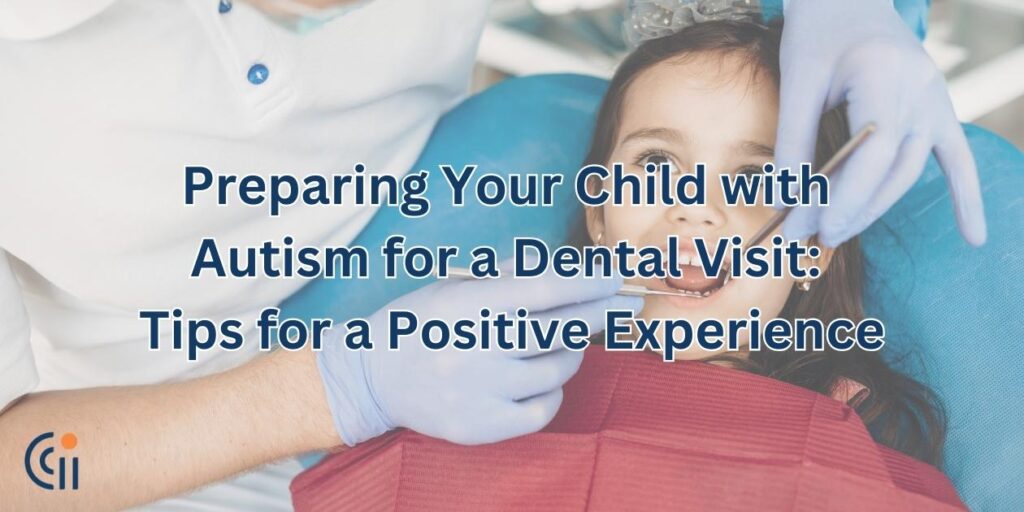
Preparing your child with Autism for a dental visit can be a challenge for many children, but for children with autism, the experience can be overwhelming. The sounds, sights, and sensations at the dentist’s office may cause anxiety or fear. With the right preparation and support, you can help your child feel more comfortable and confident. Here are some useful autism dental care tips to make dentist visits for autistic children easier and less stressful.
Autism Dental Care Tips: Why Dental Visits Can Be Challenging
Children with autism may have sensory sensitivities that make dentist visits harder. The bright lights, loud noises, and unfamiliar smells in a dental office can be overwhelming. For some children, having someone touch their face or open their mouth wide can cause discomfort. These sensory challenges can lead to fear or anxiety about the visit.
In addition, many children with autism have difficulty with communication. This can make it harder for them to express their feelings or understand what’s happening during a dental visit. Preparing your child with Autism for a dental visit in advance can make the experience more manageable.
Dentist Visits for Autistic Children: Preparation Is Key
The key to a successful dental visit for children with autism is preparation. Here are some steps you can take to help your child feel more comfortable:
- Use Visual Aids and Social Stories
Social stories are a great way to prepare your child for a dentist visit. These stories can help explain what will happen step-by-step, so your child knows what to expect. Use pictures or videos to show the different steps of a dental visit, such as sitting in the chair, getting a cleaning, and meeting the dentist. This helps reduce uncertainty and anxiety. - Practice at Home
Before the visit, practice some of the things your child will experience at the dentist’s office. For example, you can practice opening their mouth wide, brushing their teeth with a new toothbrush, or sitting still in a chair. These activities can help your child get used to the actions involved in a dental visit and make them feel more in control. - Prepare for Sensory Challenges
If your child is sensitive to lights, sounds, or touch, talk to the dentist beforehand. Many dental offices are willing to make accommodations for children with autism, such as using quieter equipment or dimming the lights. You can also bring noise-canceling headphones, a favorite toy, or a comfort item to help your child feel more at ease. - Choose a Dentist Experienced with Autism
Some dentists specialize in working with children with autism. Look for a dentist who has experience with dentist visits for autistic children and who understands the unique needs of children with sensory sensitivities. A good dentist will be patient and willing to take extra time to make your child feel comfortable. - Schedule Appointments at the Right Time
Try to schedule the dental visit at a time when your child is typically calm and not overstimulated. For example, if your child tends to be more relaxed in the morning, consider booking the appointment during that time. Avoid scheduling dentist visits when your child is tired, hungry, or already overwhelmed.
During the Dental Visit: What to Expect
The dental visit itself can be an adjustment for your child. Here’s what you can expect and how to support your child during the appointment:
- Communicate with the Dentist and Staff
Let the dentist and office staff know about your child’s sensory needs and any challenges they may face. If your child is non-verbal or has difficulty communicating, make sure to explain how they communicate and what helps them feel comfortable. This can help the staff be more prepared and supportive. - Stay Close to Your Child
Being close to your child during the visit can help them feel more secure. Hold their hand, talk to them softly, and offer reassurance throughout the appointment. Having a parent nearby can be comforting and provide a sense of safety. - Take Breaks if Needed
If your child becomes overwhelmed during the appointment, it’s okay to take breaks. Let the dentist know if your child needs a moment to calm down. Taking breaks can help your child process the experience in small steps rather than feeling overwhelmed by the entire visit at once. - Use Positive Reinforcement
Reward your child for their efforts. Praise them for sitting in the chair, opening their mouth, or following instructions. You can also offer a small reward after the visit, such as a favorite snack or extra playtime. Positive reinforcement can help your child associate dental visits with positive experiences.
What to Do After the Dental Visit
Once the visit is over, it’s important to continue supporting your child. Here are some tips for after the dental visit:
- Praise Your Child
Give your child praise for getting through the appointment. Even if the visit wasn’t perfect, acknowledge their efforts and bravery. Positive reinforcement goes a long way in building confidence for future visits. - Talk About the Experience
After the appointment, talk to your child about what happened. If they were anxious or scared, help them express their feelings. You can also talk about the next dental visit, so your child is better prepared next time. - Keep Up with Oral Care at Home
Consistent oral care at home is important. Continue to make brushing and flossing a regular part of your child’s routine. If your child struggles with brushing, try using a toothbrush with a soft bristle or flavored toothpaste to make the experience more pleasant.
Contact Circle City ABA for Support with Autism and Dental Visits
If you need help preparing your child for a dental visit or managing sensory challenges, Circle City ABA can support you. Our team specializes in ABA therapy services that can help your child manage anxiety and build coping skills for everyday activities, including dental visits.
Contact our admissions team today to learn more about our ABA therapy services and how we can help your child navigate dental care and other challenging experiences. Find a location near you. We serve Arizona, Georgia, Indiana, Iowa, and Nebraska.
Preparing your child with autism for dental visits doesn’t have to be stressful. By using these autism dental care tips and taking the right steps, you can help your child feel more comfortable and confident during their next dental appointment.


